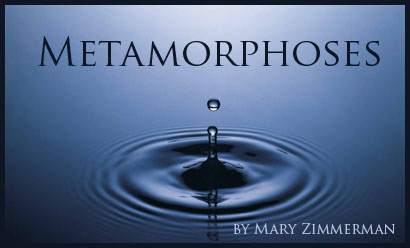




Gods, Heros, and Humans
The characters in this play range from powerful, divine gods to relatively powerless, mortal humans. Their relationships to one another are mindbogglingly complex. For starters, look at this Olympian family tree. And this one. And this one.... Note that each one is a little different. These myths were passed down via oral tradition, which means many versions proliferated.
According to Greek cosmology, once the Olympian gods wrested control from their forebears, the Titans, they became the most powerful beings in the universe. It is widely held that there were twelve Olympian gods, although there are various interpretations of just which gods were among the twelve. Zeus, Poseidon, Aphrodite, Apollo, Hermes, Hera, Ares, Athena, and Artemis are nearly always included; of these, the first five appear in the play Metamorphoses. Hades, Demeter (Ceres), and Dionysus (Bacchus), who also appear in the play, are often counted among the twelve as well.
In addition, the Greeks worshipped scores of lesser gods. Like the Olympians, these gods were immortal and had supernatural powers, but their powers tended to be more narrowly focused on the specific tasks they were charged to perform. Examples of these lesser gods in the play are Iris, goddess of the rainbow, Eros, god of love, Morpheus, god of dreams, Vertumnus, god of spring, Sleep, and Hunger.
Greek myth also included many non-human beings. Wood nymphs, like Pomona and Eurydice, were not immortal but lived as long as the tree from which they had sprung. Followers of Dionysus, like satyrs and Silenius, were also mortal, but never seemed to die in the stories. Other characters started out human, but then transformed into other living things, such as Baucis, Philemon, Myrrha, Ceyx, and Alcyone.
Alcyone is one example of a human with one divine parent. Sometimes the children of one god and one human were immortal, but usually they were not. Other examples of mortals with divine heritage in the play include Phaeton and, according to some versions of the myth, Orpheus.
Humans in the myths had no supernatural powers, were mortal, fallible, and largely at the mercy of the gods' whims. There are a number of mortals of human parentage in the play, coming from various social classes. Psyche is the daughter of a king and queen and Erysichthon and Midas were mortal kings. Lucinda and the Nursemaid are examples of the least powerful beings in the myths, mortal servants.
Read more about Greek myths on the following websites, which cast member Brian Chavez found in his research:
This one has a lot of information about myths, listed alphabetically, and is easy to use
This one has descriptions of most of the major myths
This one does not have as many of the myths but what it does have is very useful.
This one has useful info about specific myths
This one has brief descriptions of the greek gods



